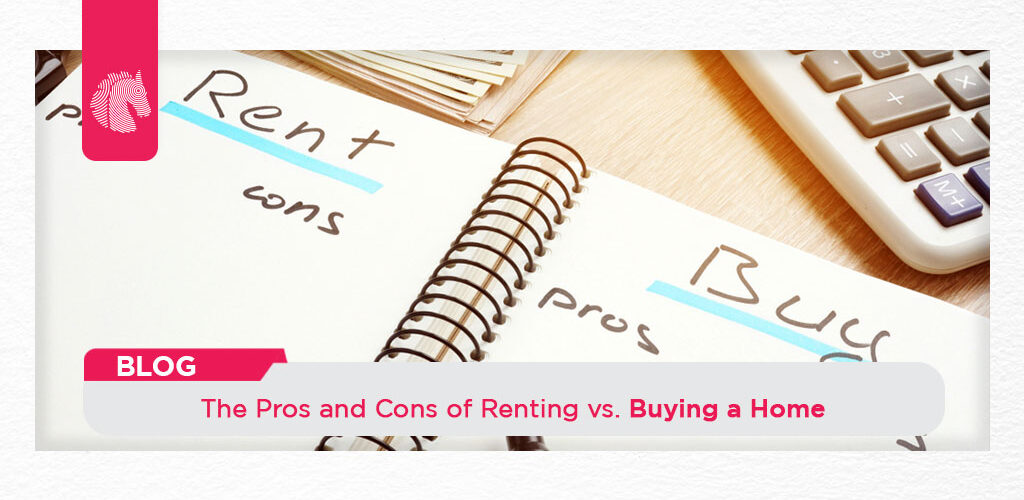The Pros and Cons of Renting vs. Buying a Home

There are many ways to generate revenue from real estate. One can invest by buying a property, constructing a house or commercial building to generate profit, renting out the property or earning through house flipping. The construction sector is also one of the lucrative industries generating remarkable profit.
Like every investment opportunity, there are pros and cons associated with renting a house or apartment or buying the one you desire. However, learning about the pros and cons of buying and renting a house is important. It will help you make a wise decision. Remember that it all depends on what you really want and what you can afford realistically. Also get to know about home buying tips.
Pros and Cons of Buying or Renting Real Estate
There is no definite answer about what you should be doing, buying or renting, as it all depends on market trends, economic situations, what you want and your budget. But, before making a decision knowing about the advantages and disadvantages clears out the confusion, and you can decide better.
Here we are with the pros and cons of renting and buying a house that one must be aware of. So let’s get started:
Pros of Renting a House
There are plenty of advantages / pros of living in a rental house or apartment. Let’s discus the pros in detail:
· Enhanced Adaptability:
As living in a rental property involves a temporary agreement, tenants have the freedom to quickly relocate to a new house or apartment with minimal notice. They can avoid the hassle of searching for a replacement tenant or transferring the lease, as those responsibilities lie with the landlord.
The enhanced adaptability/ flexibility significantly amplifies the flexibility of renting, particularly advantageous for young professionals whose job requirements may entail prolonged stays in diverse areas or cities. Also learn about how to decorate your house for autumn.
· Expanded Prospects for Living:
While purchasing a house or apartment in your desired location may exceed your budget, there’s a good likelihood that you can at least secure a rental unit there. Even with limited funds, you can still reside in a popular neighborhood and relish access to first-class amenities.
Likewise, individuals who are uncertain about their preferred settlement or lack sufficient funds to invest in property can explore a multitude of opportunities by opting to rent a home. Additionally, tenants can readily seize job prospects in different cities or countries without concerns about the fate of their own residence. With Such opportunities in head people hesitate to buy a house in suburbs with less facilities and ordinary lifestyle.
· Minimal Paperwork – Simple Living:
Renting a home involves significantly less paperwork than purchasing one. While you will need to sign a tenancy agreement to safeguard your rights as a tenant and the landlord’s rights, there is no need to handle additional paperwork or file any documents.
Furthermore, individuals residing in rental properties are not burdened with the expense of property insurance, as it is the sole responsibility of the owner.
· Free of Maintenance Cost:
There are no costs associated with home maintenance for tenants, as the landlord assumes responsibility for them. Nevertheless, tenants may be liable for any property damage or specified charges outlined in the tenancy agreement.
· No Property Taxes:
Renting a house means paying rent and get free of any other extra charges. Apart from bills and rent, tenants don’t really have to worry about any other property-related costs. Whether it is some kind of landlord’s insurance or tax on property, the landlord is the one who is supposed to foot the bill. You can also read our blog on land information management system.
Cons of Renting a House
Renting a home gives lots of mental relaxation from paper work side but there are few cons attached with it. Let’s have a look!
· No Share in Property Value:
Even if you pay heavy rent every month, you do not acquire any ownership rights to the property. While renting is often more affordable than having a mortgage, those who pay the latter at least have an asset to show for their payments in the long run.
On the other hand, monthly rent payments do not contribute to building equity or granting ownership. The money you hand over to your landlord essentially disappears as soon as you part with it.
· Cost of Moving:
Without any second opinion, one of the major drawbacks of renting a home is the expenses involved in moving. It is a challenging task to pack up one’s entire life and transition to a new location, and the associated costs only add to the difficulty.
In addition to covering the fees for the moving service, tenants are also required to provide a down payment and settle any outstanding utility bills. Furthermore, if they move to a different area, they may need to consider changing their children’s schools or budgeting for increased transportation expenses.
Pros and Cons of Buying a House
Purchasing a house is a significant achievement in an individual’s life, implying that it is not a decision to be made impulsively. Here are several advantages and disadvantages of buying a house that can assist you in determining whether homeownership is the suitable option for you.
Pros of Buying a House
· Security and Reliability:
Having ownership of a house or apartment provides a feeling of financial stability and assurance. With a legally owned property, no one can compel you to relocate, and you are relieved of concerns about sudden rent hikes. Even if you opt for purchasing a house through installment payments, the monthly or quarterly installment remains consistent until the completion of payments.
If your intention is to begin a family and you have sufficient savings, purchasing a house is an excellent decision. Even if you initially start with a smaller residence, you always have the opportunity to sell it at a profit and upgrade to a better home in the coming years.
· Renovate the way you want:
As a homeowner, you enjoy absolute independence in terms of renovating your living space, such as knocking down walls to create an open living room or painting the walls to your desired colors, all without being answerable to anyone. You have the freedom to update fixtures, change the decor, enhance the garden, and even undertake significant remodeling projects to align with your personal style and requirements.
Upon purchasing a property, you also gain complete creative authority to modify and customize it. However, it is essential to be mindful of the housing society’s bylaws before making any substantial layout changes, ensuring compliance with the regulations and guidelines in place. Curious to read more related topics, checkout renovation ideas to increase your home’s value.
· Potential to Generate Profit:
Being a homeowner also presents an excellent chance to generate income by renting out your property. If you have any unused space, you can easily rent it and earn extra money while retaining ownership.
· Sense of Ownership:
Purchasing a home is undeniably the most sensible investment you will likely ever make. It is a major financial decision that offers numerous advantages, with the most significant being the feeling of empowerment it brings.
Cons of Buying a House
Buying a house comes with few cons. Let’s have a look!
· Maintenance Cost:
Owning a home is big responsibility on the shoulders of homeowners. Regardless of whether you are purchasing a newly constructed home or an older one, it is inevitable that you will encounter maintenance and repair issues within the initial months of owning the property.
From upgrading light fixtures to repairing pipe leaks, homeowners are responsible for the expenses associated with major and minor renovation work entirely on their own. While opting for a do-it-yourself (DIY) approach may save you some money, there is also the risk of exacerbating the situation.
· Lack of Flexibility:
Unlike renting a home, purchasing one restricts your flexibility to relocate or pursue job opportunities in different cities. While a tenant can simply give notice to their landlord and leave, a homeowner must navigate through a complex series of procedures to sell their house.
Moreover, they must patiently endure the process of hosting property visits, negotiating the selling price, and eventually reaching a mutually agreeable agreement with potential buyers. This entire process can consume several months at the very least.
Let’s Summarize:
So when comparing the pros and cons of renting versus owning a home, both options have their merits and drawbacks. While your financial circumstances play a significant role in determining the most suitable choice for you, it’s not solely about money. It is essential to consider your personal goals and assess whether renting or buying a home aligns better with your long-term objectives.
Read More Blogs:
















